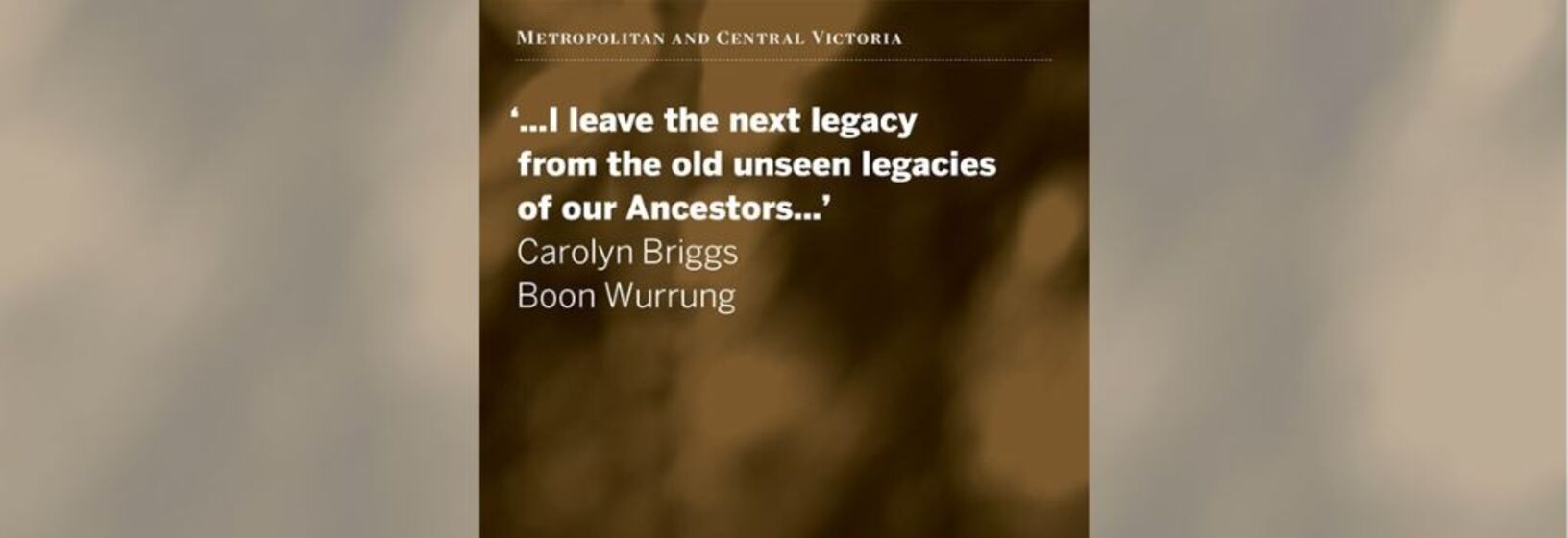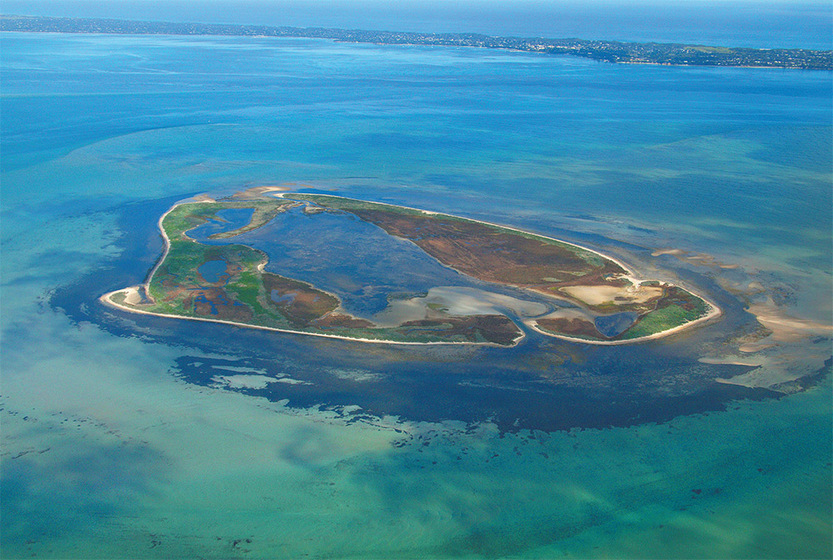Metropolitan and Central Victoria
'...I leave the next legacy
from the old unseen legacies
of our Ancestors...'
Carolyn Briggs
Boon Wurrung
Boon Wurrung: The Journey of the Iilk - Iilkyawa
The months of February and March were known to the Boon Wurrung as weegabilnye-weeny.
During this season, yel-in-wa became cooler as the ngamaee began to grow tired. Gareealngalinggu. Weegabilnye-weeny was also known as the iilk season. The female iilk began their yawawa Birrarung, wurneet that ran into nairm. The iilk had grown marrmbool on the food in Birrarung and the wurneet and baany taageek surrounding the nairm.
The female iilk were caught in long woven traps as they yawoneit wurneet. But many iilk began yawa, travelling out through weegabeel wurneet channel of nairm and into warreeny.
Once the iilk left, they would not be seen for woorrdyyalyal.
The ngamaee grew weegabeel, changing from Manemeetto Beerreen.
With the arrival of Pareip – when the murnong and guyeem apple flowered – the iilk began ngalinggu from their yawa.
The nglinggu iilk was celebrated through the ngargee held during Pareip.
The bagurrk of the Boon Wurrung decorated their yarra with murnong flowers and purple flower of the guyeem apple. They drummed on drums made from walert skins stretched tightly between their barring. They yuuring-tilbuk with a rhythm that represented the yuuring-tilbuk of the iilk as
they made their yawa. The guleeny ngargee to the rhythm created by bagurrk.
The iilk that ngalinggu were salty but marrmbool after their yawabiik. They were caught in the iilk traps, long funnel shapes carefully woven by bagurrk.
Some of the iilk were roasted over wiing, the marrmbool causing them munip to flare. Some were preserved. They were hung above the weeny burtya nuntil they were dry. Then they were hung in the branches of tarrang, dhangayan mulugu.
The yawa iilk provided certainty for the Boon Wurrung. The weegabeel people had always told them that as surely as the ngamai would rise every yel-lin-wa, the iilk would ngalinguin Pareip. The iilk worrdyyalyal yawa and ngalinggu each year was a sign of monamit.
In good years, when the biik had been cared for, the laws of Bundjil obeyed, the iilk would breed in woordyyalyal and return in Pareip woordyyalyal. They would grow marrm boolon the tubers and gugukbaanytaageek and provide the Boon Wurrung with a steady supply of food during wygabilnye-weeny.
Translated by Fay Stewart-Muir
Boon Wurrung word list
baanytaageek swamp
baanytageek swamps
bagurrk women
barring knee
beerreen no more sun, Winter
biik land
birrarung Yarra River, ‘river of mists’
Bundjil eagle/creator
burtyan smoked
dhangayan eaten
gareeal Summer rain
guguk mosquitos
guleeny men
guyeem kangaroo
iilk eels
manemeet Autumn
marrmbool fat
monamit plenty
mulugu later
munip coals, embers
murnong murnong daisy
nairm Port Phillip Bay
ngalinggu returned, come back
ngamaee sun
ngamai sun
ngargee celebrations, dance
pareip Spring
tarrang trees
wa to or from a place
walert possum
warreeny sea, ocean
weegabeel old
Weegabeelnye-weeny Old Man Sun
weegabeelwurneet old river
weeny fire
wiing coals
woorrdyyalyal many months
wurneet creek
yawa journey, long
yawawa long journey away
yawoneit swam
yel-in-wa day
yuuringtilbuk beat
Sounds of Boon Wurrung
u as in put or cook
a as in pasta
o as in hot
e as in bed
ee as in big
ii as in sleep
aa as in pass
uu as in put, but a long u
b (p at end of words) somewhere between a ‘b’ and a ‘p’ but ‘p’ at the end of words
t somewhere between a ‘d’ and a ‘t’
g (k at end of words) somewhere between ‘g’ and ‘k’, but ‘k’ at end of words
ng as in sing (often at the start of words in Boon Wurrung)
rt ‘t’ sound but with the tip of the tongue curled backwards behind the gum ridge
dj like English ‘j’
th a ‘d’ sound made with the tongue against or between the teeth
l the same as English ‘l’
rl ‘l’ sound made but with the tongue curled back behind the gum ridge
rn ‘n’ sound made but with the tongue curled back behind the gum ridge
ny ‘o’ sound made with the middle of the tongue on the roof of the mouth
m the same as English ‘m’
n the same as English ‘n’
nh the middle of the tongue at the back of the teeth while making an ‘n’ sound
rr a rolled ‘r’ sound as in the Scottish pronunciation of round
r an English ‘r’ sound as in round
Most of the words in this story follow new Boon Wurrung spelling using the alphabet above.
Some words have been used in written form for many years so are just spelt as they have been for many years, for example ‘womindjeka’ welcome.
Some words are borrowed by Boon Wurrung from Woiwurrung and Taungurung our language neighbours. These words were originally recorded from these neighbouring languages but it is likely they were Boon Wurrung words as well.











